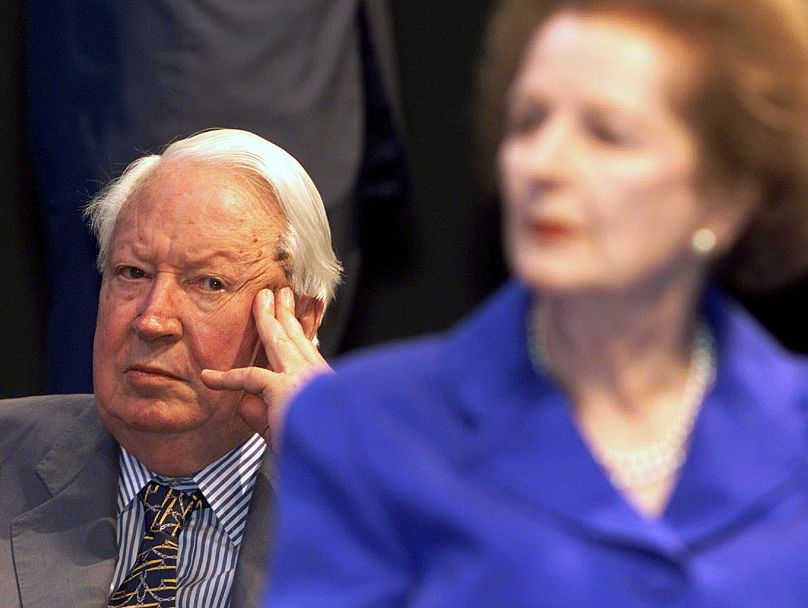The ex-foreign secretary and other Brexiteers say the government's plan would make the UK a "vassal state" of the EU, but critics say their push for total independence is unrealistic.
"Vassalage" is a word that has suddenly popped up in the Brexiteers’ lexicon more than once.
"We are volunteering for economic vassalage," Boris Johnson said of the government’s plan for leaving the EU, in his resignation speech. "Ultimately is it the greatest vassalage since King John paid homage to Phillip II at Le Goulet in 1200," Jacob-Rees Mogg tweeted a few days earlier.
The word means dependence, subjection or servitude; a "vassal" can even be a servant or a slave. Under Theresa May’s strategy, her critics say the UK is heading for a state of feudal subservience to the lord of the manor in Brussels.
In the House of Commons, the former foreign secretary — who had previously said the plan would reduce the UK to “the status of colony” — railed against “accepting the EU’s rule books” while having no say in how those rules are drawn up.
Many of those who clamour for Britain to cut free from EU shackles to forge an independent economic path are the first to remind the prime minister of her famous red lines – and the language she used to lay them down.
"We are going to be a fully independent, sovereign country," May told the Conservative Party conference in 2016. "Our laws… will be interpreted by judges not in Luxembourg but in courts across this country," she said in her Lancaster House speech the following January.
Evidence suggests these phrases are the benchmarks by which many Brexit supporters judge her plan. They quote rather less her parallel assertions in those speeches: that the UK may choose to stay close to EU rules and standards, or that "there will be give and take, there will have to be compromises".
Alarm bells
Even before the Chequers meeting at which it was unveiled, hazard lights were flashing. Rees-Mogg highlighted a poll by BMG Research for Change Britain, to imply that no more ground should be ceded to Brussels.
The survey found that between a quarter and a third of voters would be less likely to vote Conservative if the government agreed a deal which meant UK laws being subject to rulings by EU courts, the EU retaining some or substantial control of the UK’s ability to do its own trade deals, or if the UK agreed to hand over billions of pounds to the EU in return for a free trade agreement.
In contrast, only 10% or under would be more attracted to the Tories in such circumstances, the research found. It has since been borne out by a wave of hostility to the published plan among Tory grassroots supporters, as reported by the website Conservative Home.
UK 'delusions'
The mood suggests that the referendum campaign slogan of "take back control" is still uppermost in many pro-Brexit minds, with opposition to further concessions a stronger sentiment than recognition of a need for more trade-offs.
However, in Brussels diplomats are said to have long seen the UK debate over control as false - with many smaller EU states accepting pooled sovereignty as normal and even desirable.
"There is no such thing as a sovereign country any more," an unnamed EU official handling Brexit told the Financial Times. "It is an illusion the Brits are all chasing, but it has gone."
Back in the day
Yet in the early days of the UK’s membership of the then European Community, the British were chasing no such illusion – according to Robert Saunders in his recent book "Yes to Europe!" about the 1975 referendum campaign.
In a post-war era that had spawned a host of international agencies designed to constrain the freedom of individual states — and with the UK having been buffeted by successive economic crises — he says warnings about sovereignty or independence had little impact on the decision whether or not to remain part of the club the country had joined two and a half years earlier. "As polls for both sides persistently demonstrated, the issue simply failed to connect with voters, who were more concerned with food prices, job security and inflation."
The context was very different: the EEC was confined to western Europe, around a third of its current size, and its political dimension was relatively undeveloped. The British still had "the continuing salience of an imperial mindset", Saunders writes — yet they looked to exercise it as part of a larger group, to amplify their power.
Today, many on both sides of the Brexit divide agree that the May government’s negotiating plan does indeed represent a loss of sovereignty. But opinions diverge on the significance.
Vernon Bogdanor, professor of government at King’s College London, argued recently on BBC Radio that by proposing partial alignment with EU rules, the UK can only retain a "shadow of parliamentary sovereignty" in a "technical sense". Although he added that the Brexiteers’ alternative option of a cleaner break would involve massive disruption.
"National sovereignty is very difficult for a medium-sized country like Britain," he went on. "America doesn’t have to sacrifice her sovereignty, and Russia doesn’t, or China, but we’re not quite in that position. Perhaps we were in the 19th century when we had an empire."
Boris Johnson may beg to differ. "Let’s explicitly aim again for the glorious vision of… a strong independent self-governing Britain," the ex-foreign secretary told Parliament. "The UK’s admirers around the world are fully expecting us to take back control."












